Activating Markets for Social Change
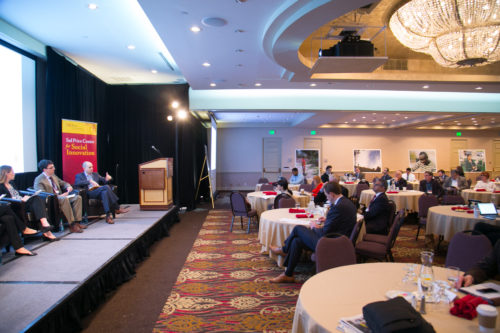
The annual USC Price Center conference magnifies the impact of social innovators by bringing them together with change leaders from around the world in a common pursuit of equality of opportunity for children and families in marginalized urban communities. Corporate, nonprofit, public sector, and foundation leaders delve into innovative strategies for leveraging capital sufficient in scale to significantly reduce concentrated poverty and improve social mobility in marginalized communities.
This day-and-a-half conference convened a multi-disciplinary team of nationally and internationally-recognized scholars and practitioners to illuminate innovative strategies around value capture for local governments, state and regional tax approaches, Pay-for-Success/social impact bonds, comprehensive community initiatives, connecting communities to 21st century jobs, social entrepreneurship and social change, and federal Promise Zones.
Click the following links to read research papers written for the Activating Markets for Social Change conference:
Rick Aubry, “Challenges to scaling Impact in Social Enterprise “
Jay Banfield, “The Expanded Talent Pipeline”
Robert Cervero, “Sustainable Transit Finance and Urbanism: Global Insights”
GRACE, Inc., “A Comprehensive Approach to Substantially Reduce Poverty in California”
Denise G. Fairchild, Ph.D., “Building a High Road – Sustainable and Just – Economy”
Chris Fox, “Activating Markets for Social Change”
Javits, “Igniting a Movement for Jobs, Growth, Opportunity and Hope”
Nonprofit Finance Fund, “Pay for Success: The First Generation”
Simón Levy Dabbah, Ph.D., “Strategies for Supporting Investment in Communities Hardest Hit by Poverty and Unemployment”
Thomas S. Lyons, Ph.D., “Leveraging Commercial and Social Entrepreneurship for the Revitalization of Marginalized Urban Communities”
McAfee, “Population Accountability the Work for Our Generation”
Myron Orfield and Thomas Luce, “Regional Tax-Base Sharing: A Policy to Promote Fiscal Equity and Efficient Development Practices at the Metropolitan Scale”
Chris Benner and Manuel Pastor, “Working for Equity: Workforce Development and Advocacy to Connect Communities to 21st Century Employment”
“One Worker One Vote”
Shumway, “Pay for Success: The Opportunities and Challenges of Pay for Success in the Philadelphia”
Silva, “Financing Community Revitalization: Enhanced Infrastructure Financing Districts” (EIFDS)
Martin O. Smolka, “Value capture in Latin America: notable experiences”
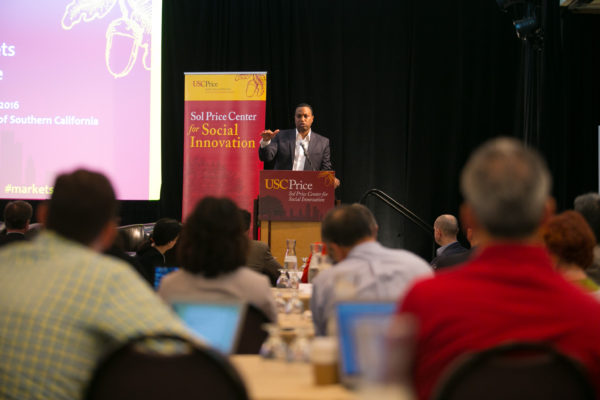
Setting the Context: Population-level Change
Dr. Michael McAfee, Vice President of PolicyLink, challenged the audience to hold population level accountability for change. He noted that for the Promise Zones, this means holding accountability for improving the lives of 16.5 million children living in poverty in America. In order to affect change, leaders must let go of old constructs and begin to think of new possibilities. This includes engaging families as authentic owners in the solution, transforming systems, doing necessary policy work, and having new conversations to shape a new strategy.
Click here to view highlights
Click here to view full video
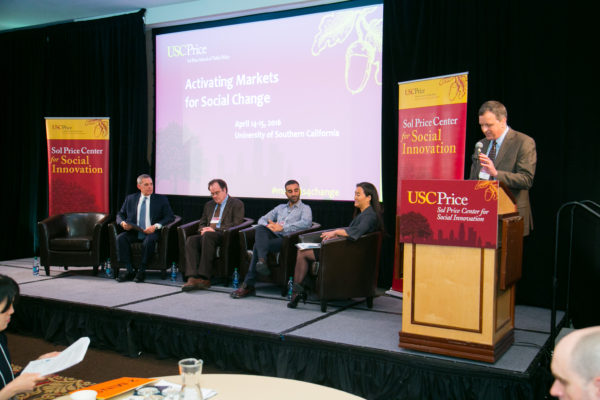
Regional Tax Approaches
The recent financial crisis has impacted state and local government resources leading to sharp reductions in public spending on public infrastructure and social services. While states have begun to recover financially, communities that have faced long histories of disinvestment continue to struggle. Recognizing the inequities of the status quo, this panel discusses state and regional strategies to ensure an equitable sharing of resources.
Panelists:
Myron Orfield, Institute of Metropolitan Opportunity (Framing)
Conway Collis, GRACE (Discussant)
Simon Levy Dabbah, ProCDMX (Panelist)
Jennifer Ito, University of Southern California (Moderator)
Click here to view highlights
Click here to view full video
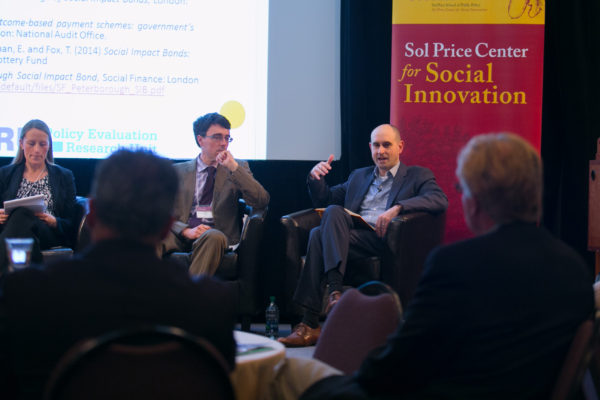
Pay for Success / Social Impact Bonds
In the face of declining public resources, Social Impact Bonds are a promising new approach to government financing of social service programs. By combining performance-based payments and market discipline, pay-for-success contracts have the potential to improve results, overcome barriers to social innovation, and encourage investments in cost-saving preventive services.
Chris Fox, Manchester Metropolitan University (Author)
Greta Hansen, County of Santa Clara (Panelist)
Jessica LaBarbera, Nonprofit Finance Fund (Moderator)
Click here to view highlights
Click here to view full video
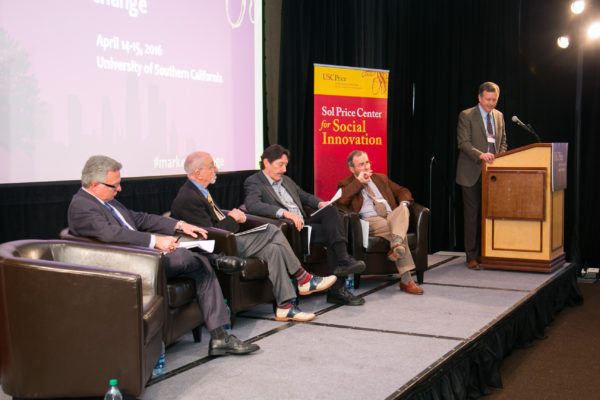
Value-Capture
Publicly funded improvements, such as investments in infrastructure and planning and land use regulation, can affect the value of land and property. Value capture is a means to realize some portion of the increase as public revenue. In the face of declining revenue and mounting needs, value capture offers a number of strategies for leveraging capital investment. This panel examines innovative strategies.
Panelists:
Martim Smolka, Lincoln Institute of Land Policy (Framing)Martim Smolka, Lincoln Institute of Land Policy (Framing)
Fred Silva, California Forward (Discussant)
Robert Cervero, University of California at Berkeley (Discussant)
Marlon Boarnet, University of Southern California (Moderator)
Click here to view highlights
Click here to view full video

Comprehensive Community Initiatives
Research shows that most of the variation in upward mobility across areas is caused by differences in childhood environments. Innovative, comprehensive, public and private partnerships are successfully creating opportunity in low-income urban communities for residents to reach their full potential. This panel surfaces innovative strategies that have had a transformative impact on whole communities.
Panelists:
David Edwards, Purpose Built Communities (Panelist)
Robert Price, Price Philanthropies (Panelist)
Anthony Iton, The California Endowment (Panelist)
Salin Geevarghese, U.S. Department of Housing and Urban Development (Framing)
Click here to view highlights
Click here to view full video
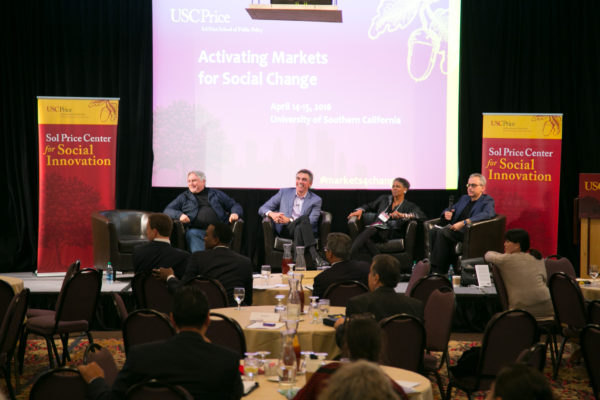
Human Capital: Connecting Communities to 21st Century Jobs
The panel profiles innovative strategies for supporting job training and job creation in communities hardest hit by unemployment and strategies for accessing career ladders that increase family income and stability.
Panelists:
Manuel Pastor, University of Southern California (Panelist)
Jay Banfield, San Francisco Bay Area Year Up (Panelist)
Denise Fairchild, Emerald Cities Collaborative (Panelist)
Michael Peck, 1worker1vote.org (Panelist)
Click here to view highlights
Click here to view full video
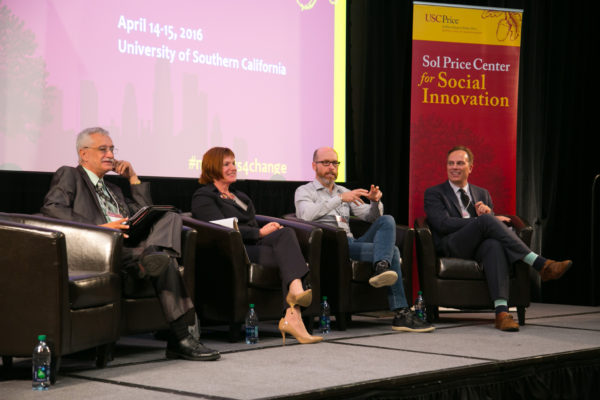
Promise Zones
Click here to view highlights
Click here to view full video
Panelists:
Ray Brewer, Field Office Director, HUD Office of Field Policy and Management (Panelist)
Alison Becker, Director, LA Promise Zone, City of Los Angeles (Panelist)
Dixon Slingerland, Executive Director, Youth Policy Institute (Panelist)
Erich Yost, Management Analyst (Community Initiatives) and Community Liaison, Los Angeles Promise Zone, U.S. Department of Housing and Urban Development (Moderator)
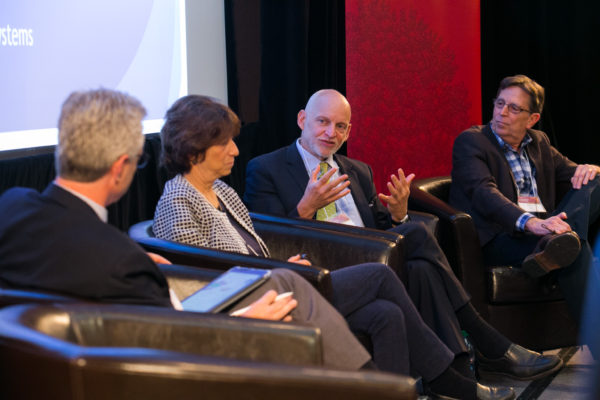
Social Entrepreneurship and Social Change
This panel profiles social entrepreneurs who are innovating new products, institutions, and policies to foster investment in low-income, urban communities. They discuss why, when and how they choose to invest in innovation and how to catalyze and scale such efforts for community-wide impact.
Panelists:
Thomas Lyons, Baruch College/CUNY (Framing Paper)
Carla Javits, REDF (Panelist)
Rick Aubry, New Foundry Ventures (Panelist)
Adlai Wertman, University of Southern California (Moderator)
Click here to view highlights
Click here to view full video
Back to Events page









